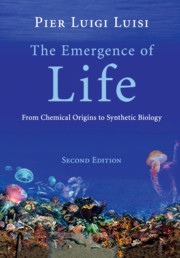Book contents
- Frontmatter
- Contents
- Acknowledgments
- Introduction
- Part I Approaches to the origin of life
- 1 Setting the stage
- 2 The hardware
- 3 Ascending the ramp of complexity
- 4 Experimental approaches to the origin of life
- 5 Origin of life from ground zero
- Part II What is life? The bio-logics of cellular life
- Part III Order and organization in biological systems
- Part IV The world of vesicles
- Part V Towards the synthetic biology of minimal cells
- As a way of conclusion
- Appendix The open questions about the origin of life
- References
- Names index
- Subject index
1 - Setting the stage
from Part I - Approaches to the origin of life
Published online by Cambridge University Press: 05 September 2016
- Frontmatter
- Contents
- Acknowledgments
- Introduction
- Part I Approaches to the origin of life
- 1 Setting the stage
- 2 The hardware
- 3 Ascending the ramp of complexity
- 4 Experimental approaches to the origin of life
- 5 Origin of life from ground zero
- Part II What is life? The bio-logics of cellular life
- Part III Order and organization in biological systems
- Part IV The world of vesicles
- Part V Towards the synthetic biology of minimal cells
- As a way of conclusion
- Appendix The open questions about the origin of life
- References
- Names index
- Subject index
Summary
Introduction
The origin of life on Earth was never a widely discussed issue until the middle of the nineteenth century. In those times, people were pious and good-natured and believed firmly that God has created the world and all living forms, once and for all. It would have been a blasphemy to doubt such a simple truth. And the blasphemy arrived in the form of a book written in 1859 by a British scientist named Charles Darwin, who refused the idea that living forms were fixed, saying instead that they were changing with time, and that they were evolving from a common ancestor. The blasphemy was very convincing and spread rapidly in the scientific community, also contaminating fields beyond biology. Darwin – adding one blasphemy to the other – arrived to postulate, in a letter written to Joseph Dalton Hooker on February 1st of 1871, that life might have originated from natural causes:
… It is often said that all the conditions for the first production of a living organism are now present, which could ever have been present. But if (and oh what a big if) we could conceive in some warm little pond with all sorts of ammonia and phosphoric salts, light, heat, electricity &c. present, that a protein compound was chemically formed, ready to undergo still more complex changes, at the present day such matter would be instantly devoured, or absorbed, which would not have been the case before living creatures were formed.
Thus the idea of the warm little pond, later called prebiotic soup or similar names, was born. And generally, in that time philosophers and biologists were increasingly accepting the idea of an origin of life based on natural laws.
At the time of Darwin, in parallel to the belief in the divine creation, there was also the idea of the spontaneous generation (abiogenesis) of simple life forms. The rationale was that God, in his grandeur, could not have had the time and will to think about the creation of such primitive forms of life. Thus, ants, flies, beetles, mosquitoes, and even rats would originate spontaneously from decaying meat or dirty laundry in the wet cellar. The work of Redi (already in 1668), and by Spallanzani one century later, aimed at providing evidence against abiogenesis, was not convincing to the community of the time.
- Type
- Chapter
- Information
- The Emergence of LifeFrom Chemical Origins to Synthetic Biology, pp. 3 - 30Publisher: Cambridge University PressPrint publication year: 2016



